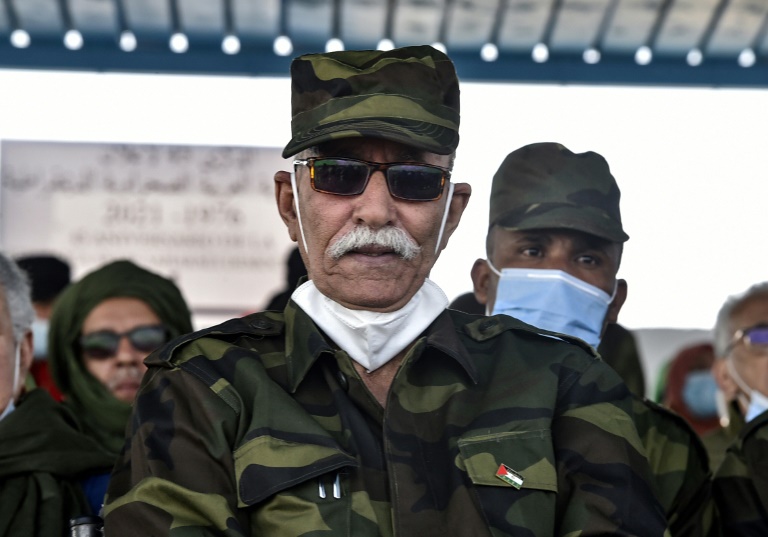The leader of Western Sahara’s independence movement will leave Spain on Tuesday night, the Spanish government said, after his reception for medical treatment triggered a diplomatic row between Rabat and Madrid.
The announcement by Madrid came just hours after a Spanish judge declined to order that Polisario Front leader Brahim Ghali, who is under investigation in Spain for torture and genocide, be taken into custody.
The decision meant there was nothing to stop Ghali from leaving Spain, a scenario feared by Morocco and the complainants who wanted him to face trial in the country.
Ghali denied the allegations against him as he testified by video conference from a hospital in northern Spain where he has been recovering from a severe case of Covid-19.
Ghali “planned to leave Spain tonight on a civilian plane from Pamplona airport”, the Spanish foreign ministry said, adding it had informed Morocco.
“Mr Ghali’s freedom of movement is not limited” because the judge had not ordered him into custody, it stressed.
The ministry did not say where his flight was headed, but the likely destination was believed to be Algeria, which supports the Polisario Front.
– Two investigations –
Spain says he was allowed into the country in April for treatment as a humanitarian gesture but the move has greatly angered Morocco.
The dispute is widely believed to have been at the root of a brief migrant crisis last month, when 10,000 people surged into Spain’s tiny North African enclave of Ceuta as Moroccan border guards looked the other way.
Ghali is facing two investigations in Spain following accusations of genocide, murder, torture and disappearances made against him by a Sahrawi activist and a Spain-based Western Sahara rights group.
During the closed-door hearing at the National Court in Madrid, the judge turned down a request from the complainants for Ghali to be taken into custody and turn over his passport, saying he posed no flight risk.
Ghali, who is also the president of the Sahrawi Democratic Arab Republic, a self-declared state since 1976, was only asked to provide an address and a telephone number in Spain where he could be reached.
Spanish government spokeswoman Maria Jesus Montero said Ghali could “return to his country of origin, where he came from” once he had recovered his health.
– Algerian plane returns –
Spanish online newspaper El Confidencial reported that an Algerian government plane had departed on Tuesday morning to the Spanish city of Logrono where Ghali is hospitalised to pick him up — but had then been turned back.
A “state” jet flying from Algeria to Logrono turned back on instructions from the Spanish military, a spokesman for civil air authority Enaire told AFP.
Citing diplomatic sources, Spain’s El Pais newspaper said Ghali was “critically ill” when he arrived on a medicalised Algerian government plane on April 18, bearing a diplomatic passport.
It said he was admitted to the hospital under a false name for “security reasons”.
Rabat, which considers Ghali to be a war criminal, has demanded a “transparent investigation” into Ghali’s arrival in Spain with what it said was a forged passport.
His Polisario Front has long fought for the independence of Western Sahara, a desert region bigger than Britain, which was a Spanish colony until 1975.
Morocco controls 80 percent of the territory, while the rest — an area bordering Mauritania that is almost totally landlocked — is run by the Polisario Front.
– ‘Totally false’ –
One of the lawsuits relates to allegations of torture at Sahrawi refugee camps in Tindouf, a town in western Algeria.
The accusations were made in 2020 by Sahrawi activist Fadel Breika, who also holds Spanish nationality.
While a Spanish court initially rejected the complaint, it agreed to reopen the case earlier this year.
“The tortures are confirmed by thousands of witnesses,” said Breika’s lawyer, Maria Jose Malagon Ruiz del Valle.
The second investigation relates to allegations of genocide, murder, terrorism, torture and disappearances made in 2007 by the Sahrawi Association for the Defence of Human Rights (ASADEDH) which is based in Spain.
Ghali’s lawyer, Manuel Olle, said the accusations against his client “are totally false” and are “politically motivated to target the credibility of the Sahrawi people”.
The UN refers to Western Sahara as a “non-self-governing territory”.
After 16 years of war, Rabat and the Polisario signed a ceasefire in 1991, but a UN-backed referendum on self-determination has been repeatedly postponed.










